That Gross Domestic Product (GDP) is an outdated and misleading metric of the economy is widely accepted. The problem isn't an abstraction, as we manage what we measure and so policymakers and citizens alike make decisions on what's being measured. If what's being measured is misleading, then we're flying blind.
Economist Joseph Stiglitz has long advocated for an overhaul for what we measure economically, focusing on well-being rather than adding up transactions. A new book The Measure of Progress: Counting What Really Matters, explains the difficulty of the overhaul. A recent article on the topic addressed the urgency of the task (Foreign Affairs, May/June 2025, paywalled):
"For Americans, these are tumultuous times. Inequality in income and wealth is at historically high levels. Artificial intelligence is reshaping society at an unprecedented pace, prompting layoffs and putting entire professions at risk. According to an estimate by the Brookings Institution, up to 85 percent of current workers in the U.S. labor force could see their jobs affected by today's generative AI technology. In the future, that percentage could climb even higher.
At moments of danger and uncertainty, it is usually the task of governments to protect people and help them navigate change--to step in when markets cannot. Yet Americans seem to have little belief in Washington's capabilities. Over the past two decades, public trust in the U.S. government has plummeted by 40 percent. Some Americans believe the federal government has been absent. Others believe it has failed to meet pressing challenges, including the rising cost of living, and the potential disruptions of AI. Either way, Washington has its work cut out for it as the government tries to regain Americans' trust.
So where can it start? The Measure of Progress, meanwhile, takes aim at the economic data that states use. According to Coyle, analysts evaluate the economy using outdated, limited metrics, causing policymakers to misunderstand the challenges citizens face.
Coyle's book is focused on understanding the economy as it exists today. But her argument--that analysts and governments have failed to properly measure peoples' well-being--is equally essential. The metrics that economists use, Coyle insists, are inherently flawed and do not sufficiently represent the reality of economic activity and value. That poses an immense problem for policymakers and analysts, distorting their view of the world and potentially leading them to faulty conclusions and ineffective policies."
The problem is multi-faceted. GDP and other metrics were institutionalized in the industrial age, where agriculture and factory production were easy to measure. As these sectors' share of the economy has slipped, the "hard-to-measure" parts of the economy are now dominant--81.5% by one estimate.
There are many other critical wrinkles in measuring the economy as it is. The book raises the issue of unpaid work, such as families caring for elderly parents and the unpaid "shadow work" that we're required to do now to keep all of our technology functioning. All this activity occurs outside the traditional market.
Since our metrics don't put a price tag on clean air and functional ecosystems, these are left out of the calculations, as if they don't exist. Not only do they exist, they're critical to our well-being. The book discusses natural capital accounting as an alternative, but alternative measures like this are inherently more challenging than toting up transactions.
What if we decided to measure the economy by the quality of life of the citizenry? While there are endless possibilities of what goes into quality of life, we can start with these basics:
1. Our physical and mental health.
2. The health of our social order--our social contract, social trust, communities and trust in our key institutions
3. The security and stability of our livelihoods and financial future.
Defining health isn't that difficult. A healthy person doesn't need any medications because, well, they're healthy, so there's no need for any interventions. A healthy person has an HDL / triglyceride ratio (calculated by dividing your triglyceride level by your HDL cholesterol level) well under 2, can walk a mile without even noticing, can stand on each foot for an extended time, and so on.
As for mental health, numerous studies have found that social connections are critical to our overall health, along with what we might call sufficiency--enough financial resources to secure the basics of life, and enough opportunities to fulfill one's potential.
Let's go through some charts of what we already measure. Here is a chart of our metabolic health. Over 50% of adult Americans are diabetic or prediabetic. This is a serious disease that shortens our lives.
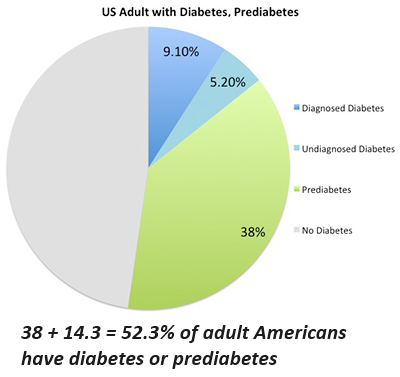
Only a quarter of the adult population is normal (i.e. healthy) weight, reflecting an unhealthy lifestyle of processed foods and inactivity.
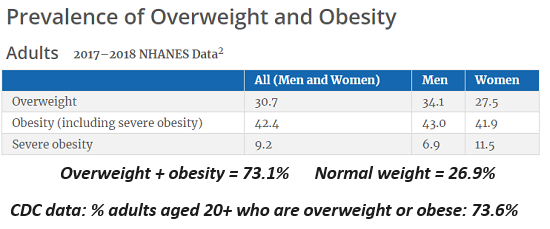
As for mental health, consider teen depression rates. Teen suicide rates have also risen. There is no way to interpret this as healthy.
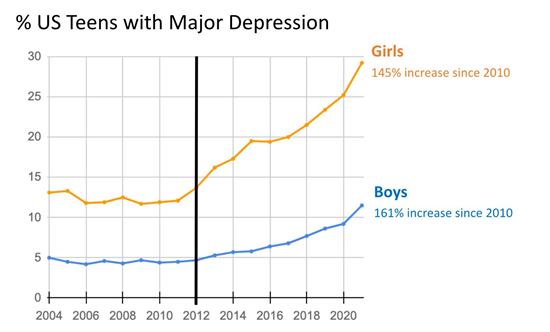
Loneliness--a measure of declining social connections--is also rising sharply.
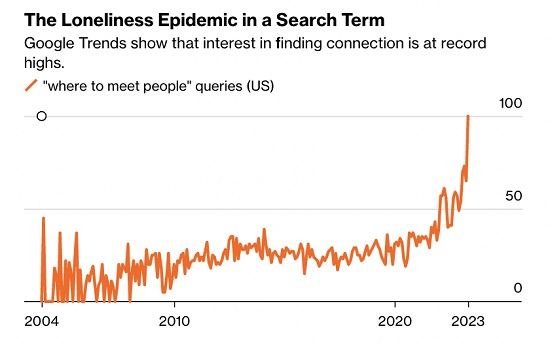
I prepared this chart of our unhealthy lifestyle and built environment in 2008. Nothing has changed. We can try to sugarcoat all these, but sugarcoating doesn't change reality.
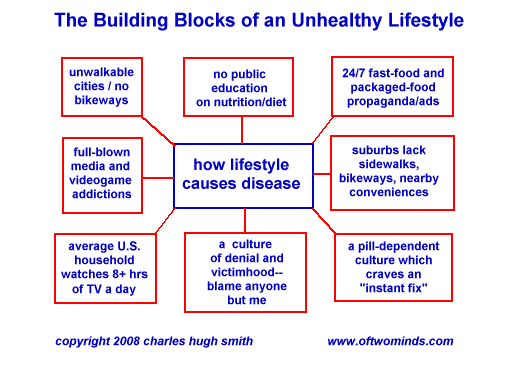
Turning to the social and economic sources of stability, security and opportunity, consider the astounding rise of student loan debt, as attending college / university went from being affordable to requiring lifetime debt serfdom.
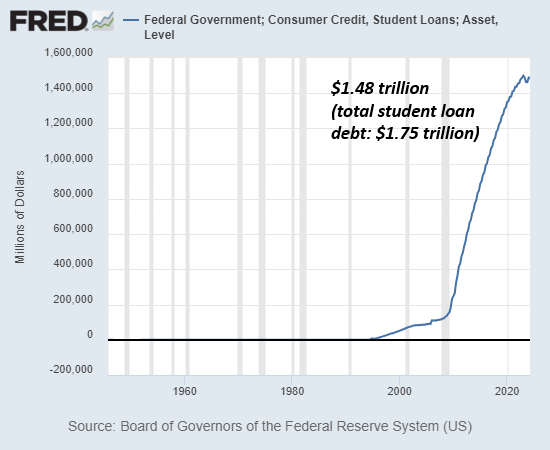
Student loan delinquencies reflect precarity and insecurity, not prosperity and security.
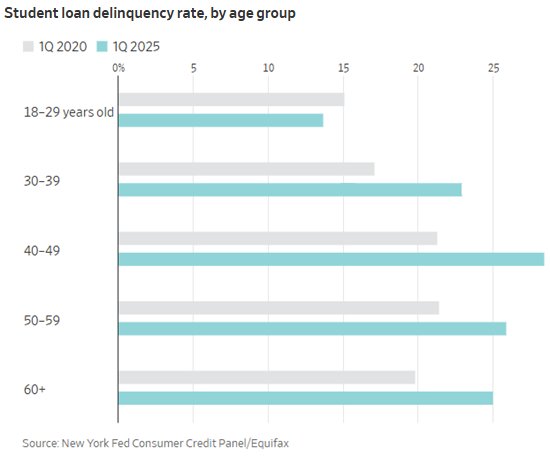
As for opportunity in an economy and society that claims to be a "level playing field," the benchmarks of middle-class security are no longer within reach. The number of 30-year olds who are both married and homeowners has plummeted. Yes, we can quibble about statistics like this, but quibbles are apologists' favorite tools: it's not so bad. But this is just more sugarcoating.
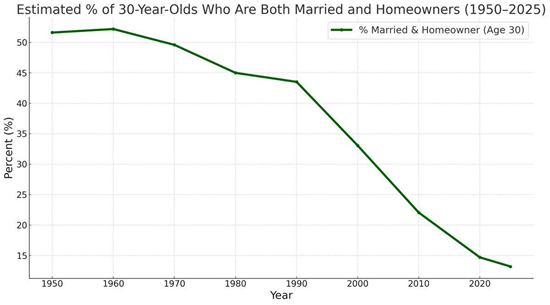
This chart of spending by income group reveals an enormous wealth-income divide. The top 10% collect virtually all the unearned income (from investments), collect over 40% of all the earned income and account for half of consumer spending. The bottom 60%--200 million Americans--account for one-quarter of total spending--half of what the top 10% (34 million Americans) spend.
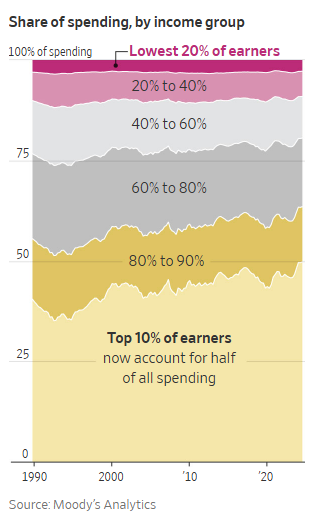
The chart of generational wealth indicates opportunities to build wealth were more accessible pre-2000. Those graduating from high school or university in 2008 or later experienced a much different economy than their parents.
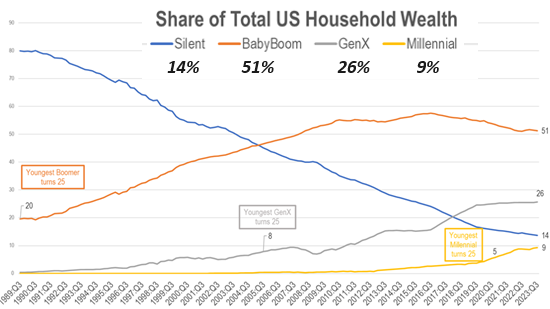
The health of the society is a key element in stability, security and opportunity. Social trust is eroding.
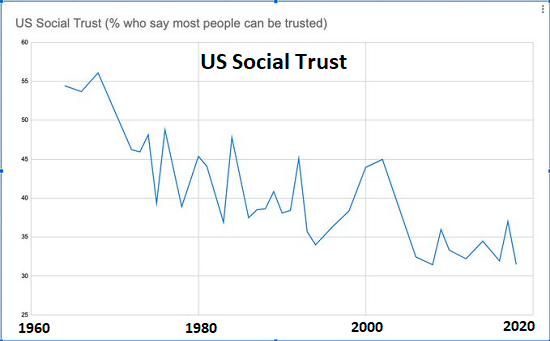
Trust in elites and institutions reflects the wealth-income divide. The top 10% reckon everything's going great because they're doing great. Meanwhile, the bottom 90% live in a completely different world.
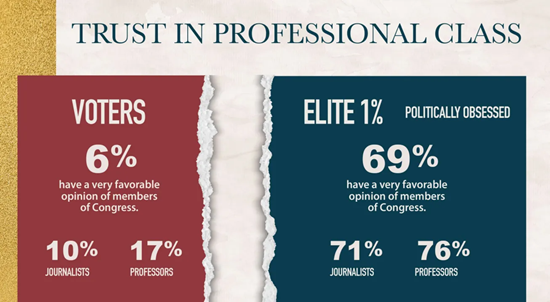
Being born into a wealthy household offers numerous advantages that are difficult for those without these advantages to match. Admissions to elite university reflect this divide. This reflects a neofeudal economy and social order.
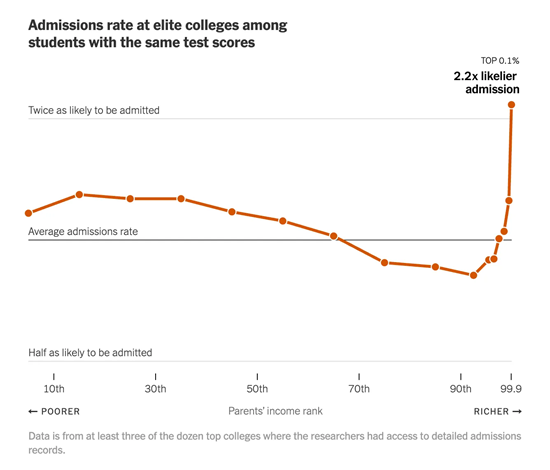
The wealthy own the vast majority of income-generating assets. The majority depend on wages for their living. The decline of wages' share of the economy over the past 50 years is consequential, reflecting the cumulative transfer of $150 trillion from wage earners to capital over the past five decades.
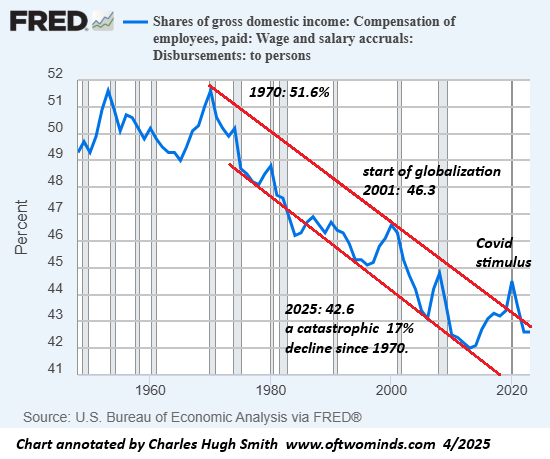
Wealth and income inequality has reached levels that do not reflect a healthy economy or social order.
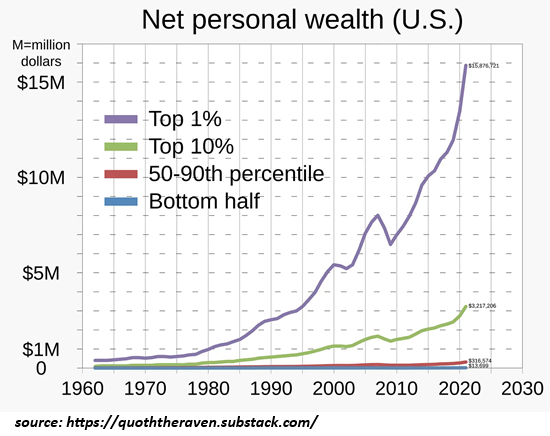
The share of income going to the bottom 90% has declined.

The bottom 50% of American households own a tiny slice of the nation's financial wealth. The vast expansion of central bank stimulus and the resulting asset bubbles haven't increased the wealth of the bottom 170 million Americans, which hovers at 2.6%--signal noise compared to the 31% owned by the top 1% and the 68% owned by the top 10%.
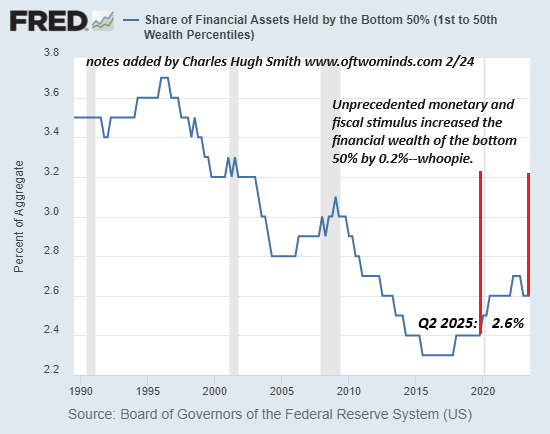
How would we rate the US economy in terms of quality of life? It's clear that we'd have to conclude it's in a deep Depression. Can we really sugarcoat all this with claims everything's going great because GDP is rising and AI is making some of us rich?
As for all the cheerleading about how great the economy is doing--GDP is like collecting data on passenger satisfaction with the dessert cart on the Titanic and declaring everyone is delighted as the great "unsinkable" ship settles into the icy waters of the Atlantic.
New podcast: KunstlerCast 430: Finance and The Ultra-Processed Life (1 hr)
Check out my updated Books and Films.
Become a $3/month patron of my work via patreon.com
Subscribe to my Substack for free
My recent books:
Disclosure: As an Amazon Associate I earn from qualifying purchases originated via links to Amazon products on this site.
THE REVOLUTION TRILOGY:
Investing In Revolution Ultra-Processed Life The Mythology of Progress
Systemic Problems/Solutions
Investing In Revolution (2025) Introduction (free)
The Mythology of Progress (2024) Introduction (free)
Global Crisis, National Renewal (2021) Introduction (free)
Money and Work Unchained (2017) Introduction (free)
A Radically Beneficial World (2015) Introduction (free)
What You Can Do Yourself
Ultra-Processed Life (2025) Introduction (free)
Self-Reliance in the 21st Century (2022) Introduction (free)
When You Can't Go On: Burnout, Reckoning and Renewal (2022) Introduction (free)
Get a Job, Build a Real Career and Defy a Bewildering Economy (2014) Intro (free)
Novels
The Adventures of the Consulting Philosopher Intro (free)
The Secret Life of an Asian Heroine First chapters (free)
Become a $3/month patron of my work via patreon.com.
Subscribe to my Substack for free
NOTE: Contributions/subscriptions are acknowledged in the order received. Your name and email remain confidential and will not be given to any other individual, company or agency.
|
Thank you, R.S.H. ($7/month), for your magnificently generous subscription to this site -- I am greatly honored by your support and readership. |
Thank you, Nicolas L. ($7/month), for your marvelously generous subscription to this site -- I am greatly honored by your support and readership. |
|
|
Thank you, Gordon ($70), for your superbly generous subscription to this site -- I am greatly honored by your support and readership. |
Thank you, Lorenz Z. ($7/month), for your splendidly generous subscription to this site -- I am greatly honored by your support and readership. |
